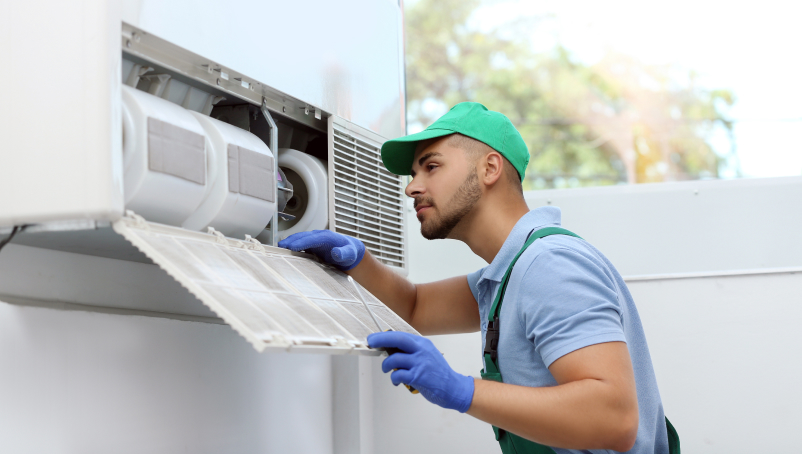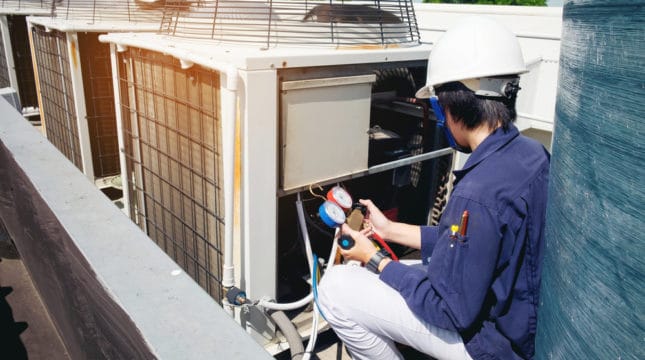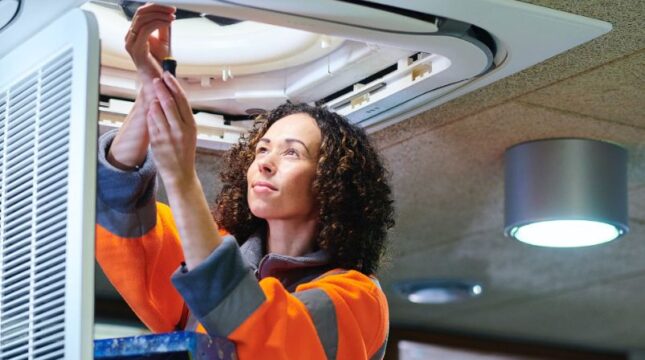Do you need to get an HVAC license in Pennsylvania?
No. Currently, Pennsylvania doesn’t require licensure or certification for most construction contractors (or their employees). However, some local municipalities may require licensing and certification for specific jobs such as HVAC or refrigeration. Check the municipalities where you want to operate.
Although HVAC professionals do not have a state-level license, many will need the federal-level Environmental Protection Agency’s EPA 608 certification to work with refrigerants. The EPA certification process involves taking a written exam specific to the type of equipment you want to work with.
Insurance for Pennsylvania HVAC contractors and technicians
HVAC insurance is regulated both at the local and state levels. Some counties will require certain levels of Pennyslvania business insurance, so it’s advisable to check with local authorities. Generally, the following types of insurance can help protect HVAC technicians:
Workers’ Compensation insurance
Workers’ comp insurance is regulated at the state level. Generally, any employer who hires at least one employee, part-time or full-time, must get this coverage. Workers’ comp can help provide wage protection and other benefits if an employee gets injured on the job.
Learn more about workers’ comp for contractors.
General Liability insurance
General liability insurance in Pennsylvania can help cover the costs of accidents and injuries or property damage to third parties. This is one of the most common types of business insurance, so many local authorities may require this coverage before allowing you to work.
For example, in Philadephia, home improvement contractors must submit a certificate of insurance to register their business and apply for permits (minimum $500,000 per occurrence)
Learn more about general liability for contractors.
Commercial property insurance
You’ll need commercial property insurance for buildings, inventory and equipment protection. It helps cover your business structure and gear in the event of damage to your property.
Business Owner’s Policy
A business owner’s policy, or BOP insurance, provides broad coverage of general liability and commercial property policies combined in a single, cost-efficient bundle. It can help cover damage that you or your employees may accidentally cause to another person’s property and help protect your business equipment in the event of a fire or other covered event.
Tools and equipment insurance
Tools and equipment insurance can help cover the costs of replacing and repairing damaged or stolen work equipment. NEXT offers this as an add-on to a general liability policy for contractors.
Commercial auto insurance
If you drive for work, commercial auto insurance helps protect against costs related to accidents, such as property damage and medical expenses. Even if you use a personal vehicle and have car insurance, it may not cover work-related activities.
In Pennsylvania, all drivers must carry:
- $15,000 per person / $30,000 per accident for bodily injury coverage
- $5,000 for property damage
- $5,000 for first-party benefits (FPB)
How to get an HVAC license in Philadelphia
While the City of Brotherly Love doesn’t have a specific HVAC license to work as a contractor, they do require licensing for aspects of HVAC systems work — it really depends on the type of work you want to do. Philadelphia’s Department of Licenses and Inspections offers the following four HVACR-related licenses:
Sheet metal apprentice license
If you want to install, maintain and service the sheet metal used in HVAC systems, you must first get a sheet metal apprentice license.
Apprentices must be enrolled in a certified apprenticeship program through the United States Department of Labor or the State Apprenticeship Council. They must also work under the direction of a professional sheet metal technician or licensed contractor; they can’t run their own HVAC business.
To get an apprentice license, you can apply for the license online through eCLIPSE or in person at the Permit and License Center. The license costs $87 plust a non-refundable fee of $20.
The license must be renewed every three years.
Sheet metal technician license
Individuals who install, maintain and service sheet metal used in HVAC systems can apply for this license. It qualifies license holders to work as sheet metal technicians for a licensed contractor but does not authorize them to run a business.
You must complete a registered sheet metal apprentice program to qualify for licensing. Candidates must complete 8,000 hours of practical experience and 800 hours of coursework/classroom instruction in sheet metal system installation, maintenance and servicing.
You can apply for the license online using eCLIPSE or in person at the Permit and License Center. The license fee is $174 plus a non-refundable fee of $20.
Licenses expire every three years.
Engineer license
In Philadelphia, you need an engineer license to operate or maintain steam boilers, hot water boilers, steam engines, hoisting engines and refrigeration machinery.
There are two classifications that apply to heating, ventilation and air conditioning professionals:
- Engineer Grade A license: For steam boiler, stationary, refrigeration engineers, and firefighters
- Engineer Grade B license: Refrigeration only
Engineering license requirements include:
- Be 18 years of age or older.
- Successful completion of the Philadelphia Engineer exam (administered by the International Code Council) for the appropriate engineer grade. You must pass the exam within 12 months of submitting your license application.
- Have two years of work experience as an engineer or helper, documented through federal tax records.
- Provide written recommendations from two licensed engineers.
- Provide a color photo (2 in. x 2 in.)
You can apply for the license online using eCLIPSE or in person at the Permit and License Center. The license fee is $58 plus a non-refundable fee of $20. This license must be renewed annually.
PA home improvement contractor license
If you perform work home improvement HVAC work on one-or-two-family dwellings, you don’t need a license, but you need to register with the Pennsylvania Attorney General’s office.
Home improvement contractor registration requirements include:
The application fee is $50.
How to get an HVAC license in Pittsburgh
The city of Pittsburgh requires you to have an HVAC contractor license to “install, erect, enlarge, repair, alter, remove, convert or replace any mechanical system” within the city. The Department of Permits, Licenses, and Inspections issues licenses.
However, the following work does not require a permit and is exempt from licensing requirements.
- Portable heating appliances, portable ventilation appliances, portable evaporative coolers and portable cooling units.
- Steam or hot- or chilled-water piping within any heating or cooling equipment
- Replacement of any minor part that does not alter approval of equipment or make equipment unsafe
- Self-contained refrigeration systems containing ten (10) pounds or less of refrigerant
- Portable-fuel-cell appliances that are not connected to a fixed piping system and are not connected to a power grid.
Pittsburgh HVAC license requirements
To get your license, you must provide:
- Proof of passing the certified standardized test. Pearson Vue proctors ICC Mechanical Master exams.
- A resume or documentation showing a minimum of four years of a combination of experience and education. You must include a statement from an employer or licensed mechanical contractor verifying experience.
- Government issued photo ID.
You can apply for the HVAC contractor license online through the OneStopPGH system. The license costs $90.
License renewals
You must renew your license annually. You need proof of completing eight hours of continuing education within the previous twelve months from the license renewal date. You’ll also need a government issued photo ID.
Pennsylvania HVAC license reciprocity
Because Pennsylvania does not require a state-level license, it also does not regulate reciprocity agreements with other states for HVAC technician licenses. If you have a license from another state, you must comply with local licensing requirements.





